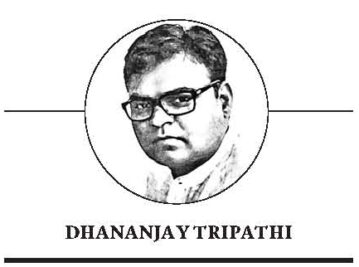Opinion: Why Ambedkar matters in global discourse
Ambedkar’s voice offers a crucial foundation for non-Western perspectives in International Relations, one that calls for a more inclusive world order

By Dhananjay Tripathi
Every nation has its share of towering thought leaders who not only defined the debates of their time but left behind ideas that remain powerfully relevant for generations to come. For India, Dr BR Ambedkar stands as one such figure. Known as the principal architect of the Indian Constitution, Ambedkar was also a fierce advocate for equality and dignity — values that resonate far beyond national borders.
Also Read
At a time when the world grapples with alarming levels of inequality, both economic and social, Ambedkar’s call for justice, respect, and human dignity is more relevant than ever.
Reality of Global Inequality
We live in a world where economic disparity has reached staggering heights. According to a 2020 Oxfam report, cited by the World Economic Forum, the world’s billionaires saw their wealth grow by a mind-boggling USD 2.7 billion per day.
Even more shockingly, the top 1 per cent of the global population has captured nearly two-thirds of all new wealth created amounting to USD 42 trillion, while the remaining 99 per cent shares the rest. These aren’t just numbers. They reflect a deep structural imbalance in how global wealth and opportunities are distributed. An imbalance that mirrors the discrimination Ambedkar fought so fiercely against.
A Discriminatory Global Order
While the liberal school of International Relations often praises global institutions for promoting peace and cooperation, a closer look reveals a very different picture. Many international organisations, be it the United Nations or the Bretton Woods institutions like the IMF and World Bank, remain under the tight control of Western powers.
Take the UN Security Council, where a handful of nations wield veto power, blocking reform and often ignoring the collective voice of the majority. Similarly, leadership positions at the IMF and World Bank are traditionally reserved for Americans and Europeans, reinforcing a colonial hierarchy in modern dress. Despite decades of change, the structure of the global order still reflects the interests and dominance of a few. The voices of the Global South continue to be marginalised.
Post-Colonial Nations
The current international system was designed largely in the 19th and early 20th centuries, during the height of European imperialism. At that time, much of the world was under colonial rule. Colonised countries were denied basic political agency. Their people were uprooted and shipped off as slaves, soldiers, and indentured labourers. Their borders were drawn without consent. Their resources were extracted to build the wealth of their colonisers.
Even after gaining independence, former colonies were left out of the global decision-making process. Economist Utsa Patnaik points out, countries like Britain built their economic power by extracting trillions from their colonies — USD 44.6 trillion from India alone through unjust taxation and trade practices.
When we speak today of a just global order, we are perhaps unknowingly echoing Ambedkar’s core beliefs — justice, decolonisation, and human rights
One particularly tragic example is Haiti, which, after winning independence from France in 1804, was forced in 1825 to pay 150 million gold francs to its former coloniser as “compensation” for lost land and enslaved labour. That extortion left Haiti buried under debt and poverty for generations.
Ambedkar’s Core Beliefs
Dr Ambedkar dedicated his life to fighting discrimination, not just in terms of caste but in defence of human dignity and equality. He envisioned a world where no one is denied the right to live with respect, regardless of caste, race, gender, or class.
When we speak today of a just global order, we are perhaps unknowingly echoing Ambedkar’s core beliefs. His vision wasn’t confined to India alone. It has powerful relevance in international debates on justice, decolonisation, and human rights. His voice offers a crucial foundation for subaltern and non-Western perspectives in International Relations (IR) — perspectives that challenge the dominance of Western ideologies and call for a more inclusive world order.
International Relations Studies
In India, however, mainstream International Relations (IR) education and research still remains heavily Westernised. There is minimal academic engagement with Ambedkar within IR departments, even though global scholars increasingly explore postcolonial and subaltern theories.
India must take the lead in promoting research that frames global issues through Ambedkar’s lens. We need classroom discussions and university courses that examine world politics from the viewpoint of the Global South. This shift can challenge dominant narratives, enrich the discipline, and help build a more just and representative global system.
Need for Intellectual Reawakening
Dr Ambedkar was of the view that, “Freedom of mind is real freedom.” To truly free our minds in the realm of international thought, we must break out of the narrow corridors of Western theories and engage with our own legacies of justice and equality. The future of global order demands inclusion. The vision of Ambedkar can help us get there.

(The author is Senior Associate Professor, Faculty of International Relations, South Asian University)
Related News
-
Modi, Macron vow deeper defence, trade partnership
2 hours ago -
Sports briefs: Dharani, Tapasya clinch honours
3 hours ago -
Man arrested for cultivating ganja plants in Telangana’s Adilabad
3 hours ago -
Second successive win for Titans in Samuel Vasanth Kumar basketball
3 hours ago -
Women councillors allege misconduct by Congress in Kyathanpalli
3 hours ago -
Gauhati Medical College doctor lodges FIR alleging harassment by principal
3 hours ago -
Two FIRs filed in Chikkamagaluru after week-long stone pelting on house
3 hours ago -
Viral video shows SUV hitting biker in Dwarka, teenage driver detained
3 hours ago




